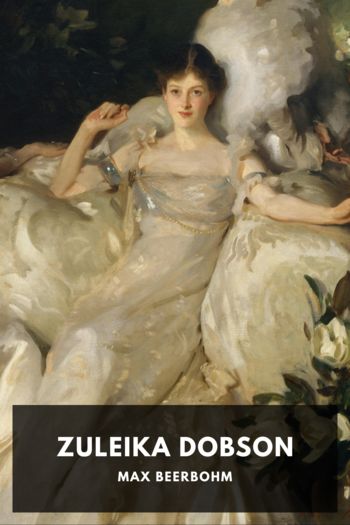Zuleika Dobson, Max Beerbohm [e ink ebook reader TXT] 📗

- Author: Max Beerbohm
Book online «Zuleika Dobson, Max Beerbohm [e ink ebook reader TXT] 📗». Author Max Beerbohm
It was fun to float all unseen, to float all unhampered by any corporeal nonsense, up and down the platform. It was fun to watch the inmost thoughts of the stationmaster, of the porters, of the young person at the buffet. But of course I did not let the holiday-mood master me. I realised the seriousness of my mission. I must concentrate myself on the matter in hand: Miss Dobson’s visit. What was going to happen? Prescience was no part of my outfit. From what I knew about Miss Dobson, I deduced that she would be a great success. That was all. Had I had the instinct that was given to those Emperors in stone, and even to the dog Corker, I should have begged Clio to send in my stead some man of stronger nerve. She had charged me to be calmly vigilant, scrupulously fair. I could have been neither, had I from the outset foreseen all. Only because the immediate future was broken to me by degrees, first as a set of possibilities, then as a set of probabilities that yet might not come off, was I able to fulfil the trust imposed in me. Even so, it was hard. I had always accepted the doctrine that to understand all is to forgive all. Thanks to Zeus, I understood all about Miss Dobson, and yet there were moments when she repelled me—moments when I wished to see her neither from without nor from within. So soon as the Duke of Dorset met her on the Monday night, I felt I was in duty bound to keep him under constant surveillance. Yet there were moments when I was so sorry for him that I deemed myself a brute for shadowing him.
Ever since I can remember, I have been beset by a recurring doubt as to whether I be or be not quite a gentleman. I have never attempted to define that term: I have but feverishly wondered whether in its usual acceptation (whatever that is) it be strictly applicable to myself. Many people hold that the qualities connoted by it are primarily moral—a kind heart, honourable conduct, and so forth. On Clio’s mission, I found honour and kindness tugging me in precisely opposite directions. In so far as honour tugged the harder, was I the more or the less gentlemanly? But the test is not a fair one. Curiosity tugged on the side of honour. This goes to prove me a cad? Oh, set against it the fact that I did at one point betray Clio’s trust. When Miss Dobson had done the deed recorded at the close of the foregoing chapter, I gave the Duke of Dorset an hour’s grace.
I could have done no less. In the lives of most of us is some one thing that we would not after the lapse of how many years soever confess to our most understanding friend; the thing that does not bear thinking of; the one thing to be forgotten; the unforgettable thing. Not the commission of some great crime: this can be atoned for by great penances; and the very enormity of it has a dark grandeur. Maybe, some little deadly act of meanness, some hole-and-corner treachery? But what a man has once willed to do, his will helps him to forget. The unforgettable thing in his life is usually not a thing he has done or left undone, but a thing done to him—some insolence or cruelty for which he could not, or did not, avenge himself. This it is that often comes back to him, years after, in his dreams, and thrusts itself suddenly into his waking thoughts, so that he clenches his hands, and shakes his head, and hums a tune loudly—anything to beat it off. In the very hour when first befell him that odious humiliation, would you have spied on him? I gave the Duke of Dorset an hour’s grace.
What were his thoughts in that interval, what words, if any, he uttered to the night, never will be known. For this, Clio has abused me in language less befitting a Muse than a fishwife. I do not care. I would rather be chidden by Clio than by my own sense of delicacy, any day.
XIINot less averse than from dogging the Duke was I from remaining another instant in the presence of Miss Dobson. There seemed to be no possible excuse for her. This time she had gone too far. She was outrageous. As soon as the Duke had had time to get clear away, I floated out into the night.
I may have consciously reasoned that the best way to forget the present was in the revival of memories. Or I may have been driven by a mere homing instinct. Anyhow, it was in the direction of my old College that I went. Midnight was tolling as I floated in through the shut grim gate at which I had so often stood knocking for admission.
The man who now occupied my room had sported his oak—my oak. I read the name on the visiting-card attached thereto—E. J. Craddock—and went in.
E. J. Craddock, interloper, was sitting at my table, with elbows squared and head on one side, in the act of literary composition. The oars and caps on my walls betokened him a rowing-man. Indeed, I recognised his somewhat heavy face as





Comments (0)